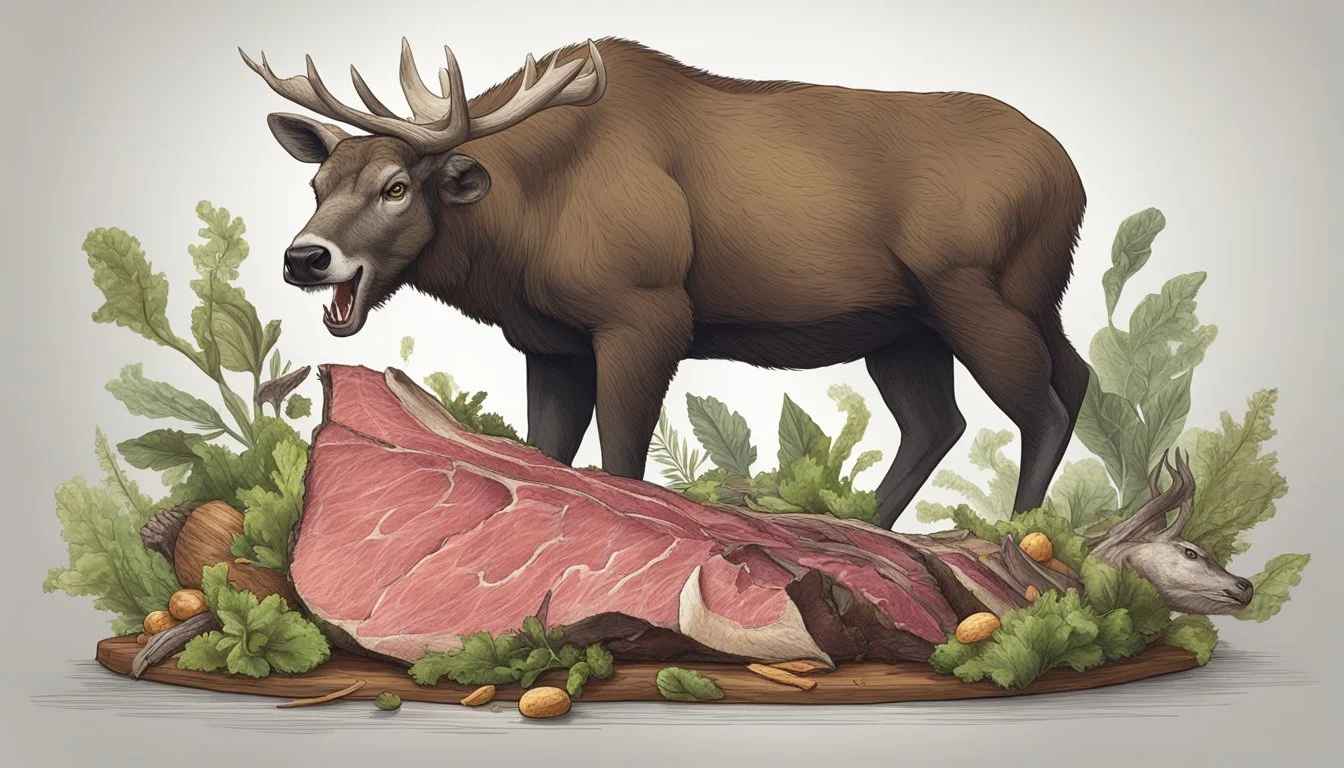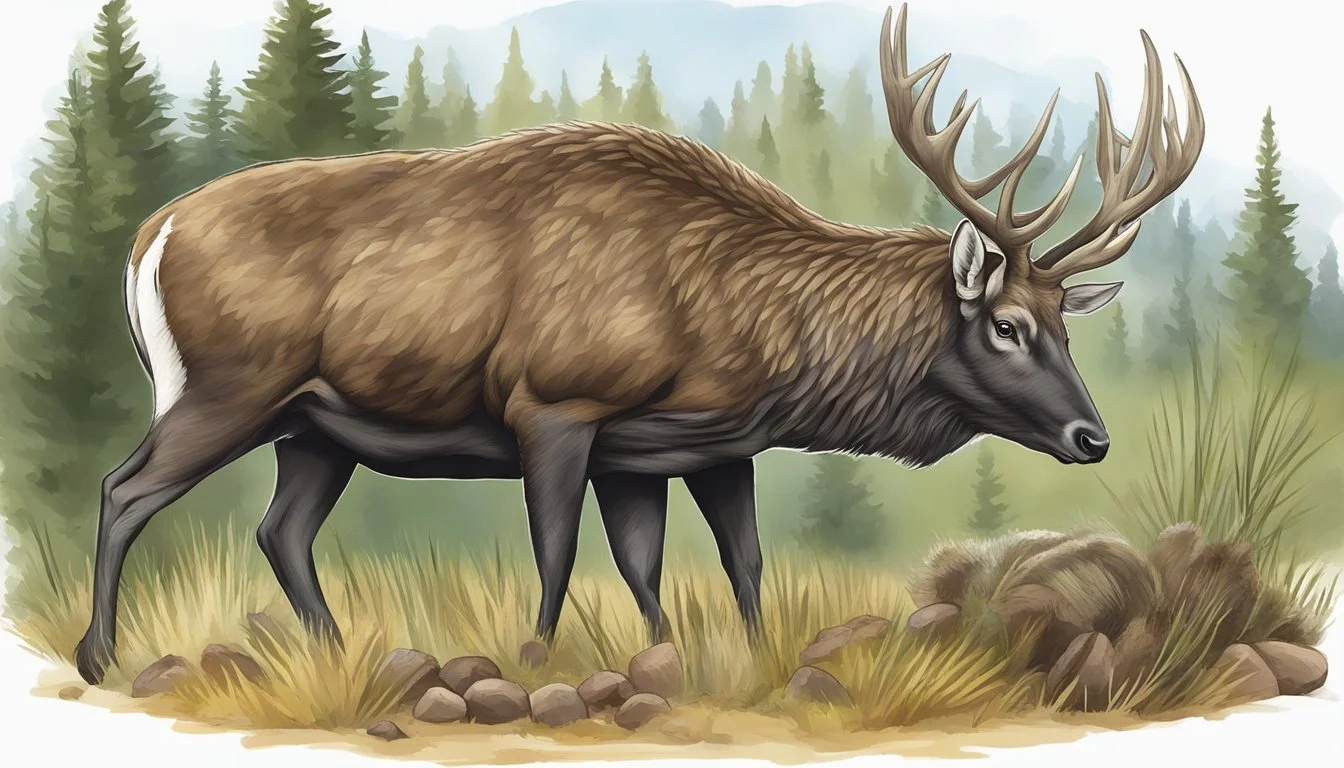Venison Nutritional Value Carnivore Diet
Health Benefits and Nutrient Profile
Venison, a lean and protein-rich wild game meat, is gaining popularity, especially among those adhering to the Carnivore Diet. This diet emphasizes consumption of animal-based products such as meats, seafood, organs, and sometimes even dairy. For individuals seeking nutrient-dense food choices on the Carnivore Diet, venison stands out as an exceptional option.
Nutritionally, venison is notable for its high protein content and low levels of cholesterol and saturated fat, making it beneficial for heart health. Each 100 grams of cooked ground venison delivers about 26.5 grams of protein, supporting muscle growth and overall wellness. With significant amounts of essential vitamins and minerals, venison aids in fulfilling the dietary needs of those following a strictly animal-based diet.
Moreover, the versatility of venison allows it to be seamlessly included in various meals, from grilled steaks to slow-cooked stews, enhancing both flavor and nutritional value. For those on the Carnivore Diet, incorporating venison not only diversifies meal options but also ensures a rich intake of clean and lean protein.
Venison in the Carnivore Diet
Venison, or deer meat, offers a nutrient-dense option for those adhering to the carnivore diet. This section covers the basics of the carnivore diet and why venison is an excellent meat choice in this dietary approach.
Fundamentals of the Carnivore Diet
The carnivore diet focuses exclusively on animal products, eschewing all plant-based foods. It includes meats, fish, eggs, and some dairy products.
A central idea is consuming high-fat, low-carbohydrate foods to avoid blood sugar spikes. This approach aims to promote satiety and potential weight loss.
Venison: A Suitable Meat Choice
Venison, known for its rich flavor, fits well within the carnivore diet. It is lean, providing high-quality protein and essential amino acids necessary for muscle repair and overall health.
A 3-ounce serving of venison contains about 96 calories, 18 grams of protein, and only 3 grams of fat.
In addition to being low in fat, venison contains no carbohydrates, making it ideal for this diet. It is also rich in B vitamins, which play a crucial role in energy metabolism.
Venison's nutrient profile makes it a robust choice for those seeking a nutrient-dense protein source within the constraints of the carnivore diet.
Nutritional Profile of Venison
Venison offers a rich source of nutrients, crucial for those on a carnivore diet. It is low in fat and calories yet high in protein and essential vitamins and minerals. These characteristics make venison an excellent choice for a nutritious and balanced diet.
Macronutrients
Venison is particularly renowned for its high protein content. A 100-gram serving of cooked ground venison provides approximately 26.5 grams of protein. This makes it an excellent choice for anyone looking to boost their protein intake. The lean nature of venison also means it contains relatively low levels of fat.
In terms of calories, venison is modest. A typical 3-ounce serving contains about 96 calories, making it a low-calorie option compared to other meats. Fat content for this serving size is around 3 grams, with minimal saturated fats, making it a heart-healthy choice.
Vitamins and Minerals
Venison is packed with essential vitamins and minerals. It contains significant amounts of B vitamins, particularly B-12, riboflavin, niacin, and thiamine. These vitamins are vital for energy metabolism and overall health.
Additionally, venison is rich in minerals like iron and zinc, which are crucial for immune function and oxygen transportation in the blood. Venison also offers a good amount of choline and vitamin K. Unlike other meats, it does not contain carbohydrates or fiber, aligning perfectly with the requirements of a carnivore diet.
Comparison with Other Meats
When comparing venison to other popular meats, its low-fat and high-protein profile stands out. For instance, beef often has higher fat content and calories per serving. A 3-ounce serving of beef typically contains about 9 grams of fat and more calories.
Poultry, like chicken, offers similar protein levels but often comes with higher fat values unless specifically selecting lean cuts. Venison's distinctive edge comes from its combination of high protein and low saturated fat, making it a suitable option for those prioritizing a lean, nutrient-dense diet.
In summary, venison's nutritional profile, highlighted by high protein, low fat, and an abundance of vitamins and minerals, makes it an appealing choice, particularly for those on a carnivore diet seeking nutrient efficiency without excess calories or unhealthy fats.
Health Benefits
Venison offers numerous health benefits, particularly for those on the Carnivore Diet. It stands out for its lean protein content and positive effects on cardiovascular health.
Lean Protein Source for Weight Loss
Venison is an excellent lean protein choice for anyone looking to lose weight. A 100-gram serving of cooked ground venison provides about 26.5 grams of protein.
Unlike fattier meats, venison is low in calories and fat. For example, a three-ounce serving typically contains 134 calories and only three grams of fat. This high protein, low-calorie combination can help people feel full longer, reducing the overall intake of calories, which is crucial for weight loss.
In addition, the lower fat content, especially less saturated fat, contributes to a healthier diet. For those focusing on macronutrient composition, venison offers a nutrient-dense option that supports muscle maintenance and growth without the extra calories.
Supporting Cardiovascular Health
Incorporating venison into a diet can support cardiovascular health. This meat is particularly low in cholesterol and saturated fats, making it suitable for those with or at risk of cardiovascular disease.
Venison is rich in essential vitamins and minerals, including B vitamins and iron. Specifically, a three-ounce serving provides 33 percent of the daily vitamin B12 and 16 percent of the daily iron requirement. These nutrients are vital for producing red blood cells and preventing anemia.
Moreover, the lower calorie and fat content in venison compared to other red meats makes it a heart-healthy protein choice. By choosing venison, individuals can enjoy the benefits of a high-protein diet without compromising their cardiovascular health.
Culinary Considerations
Venison, a nutritious option for the carnivore diet, offers unique cooking and flavor opportunities. Understanding the best techniques and flavor combinations can deepen appreciation and enjoyment of this game meat.
Cooking Techniques and Tips
Cooking venison requires precision to avoid dryness and maintain tenderness. Marinating the meat for several hours can help tenderize it and infuse additional flavors. Popular marinating ingredients include red wine, olive oil, garlic, and sage.
Roasting is a classic method, best done at low temperatures. Slow-roasting can bring out the meat’s natural flavors while maintaining its juiciness. Searing venison steaks quickly at high heat creates a flavorful crust without drying out the interior.
Venison's lean nature means it is less forgiving than beef. Using methods like braising—cooking in a flavorful liquid—can ensure the meat remains moist.
Flavor Profile and Pairings
Venison has a distinct gamey flavor, which sets it apart from other meats. This robust taste pairs well with herbs and spices like sage, rosemary, and thyme. These seasonings can be used in marinades or as rubs before cooking.
Fruits such as cranberries or juniper berries can complement venison’s strong flavor profile, adding a hint of sweetness and tartness. Cooking venison with root vegetables like carrots, parsnips, and onions can balance its richness.
To enhance the dining experience, pairing venison with bold wines like Cabernet Sauvignon can highlight its flavors. Similarly, sauces made from red wine, berries, or mushrooms can add depth to the dish.
Safety and Storage
Venison is a nutritious choice for the carnivore diet, but ensuring its safety and proper storage is crucial to prevent foodborne illnesses and maintain its quality. Here’s what you need to know.
Preventing Foodborne Illness
Preventing foodborne illness starts with proper handling from the start. Venison should be thoroughly cooked to an internal temperature of at least 160°F (71°C). This ensures harmful bacteria like E. coli and Salmonella are destroyed.
Chronic Wasting Disease (CWD) is a concern with wild venison. While CWD has not been shown to affect humans, it is recommended to avoid consuming meat from deer that appear sick.
When preparing venison, always wash hands, utensils, and surfaces that come into contact with raw meat. Cross-contamination can spread bacteria, so using separate cutting boards for meat and other foods is advised.
Storing Venison Properly
Storing venison correctly preserves its quality and safety. Fresh venison should be kept refrigerated at 40°F (4°C) or lower and should be used within 2-3 days. For long-term storage, venison should be frozen.
Freezing Venison: Wrap the meat tightly in butcher paper, plastic wrap, or vacuum-seal it to prevent freezer burn. Label packages with the date. Venison can be kept frozen at 0°F (-18°C) for up to a year.
When thawing venison, use the refrigerator or cold water method, never at room temperature. This prevents bacteria from growing on the surface of the meat while the inside remains frozen. After thawing, cook venison promptly to maintain its safety.
Sustainability and Ethics
Examining the sustainability and ethics of incorporating venison into a carnivore diet reveals several key issues. These involve the impact of venison hunting on ecosystems, its potential as an environmentally friendly meat source, and the ethical considerations in deer hunting.
Environmental Impact
Including venison in a carnivore diet can be an environmentally friendly choice compared to other meats. Venison comes from deer, which are often managed in the wild, reducing the need for resource-intensive farming.
Hunting deer can help control overpopulation, which might otherwise lead to ecosystem imbalances.
However, the sustainability of this practice depends on responsible hunting practices and adherence to wildlife management regulations. Ethical hunting minimizes harm to the ecosystem and maintains biodiversity, making the consumption of venison a potentially sustainable component of the carnivore diet.
Comparative Analysis
Venison offers unique nutritional benefits when compared to other common meats such as beef and pork. Additionally, the difference between wild game and farm-raised meats can impact the overall dietary intake.
Venison vs. Beef and Pork
Venison is notably leaner than both beef and pork, making it a good option for those looking to reduce their fat intake. In comparison, venison typically has less fat and fewer calories per serving while still providing ample protein. For example, a 3-ounce serving of venison contains about 2 grams of fat, whereas beef and pork contain approximately 7-12 grams of fat for the same serving size.
Among red meats, venison stands out due to its gamey flavor, which may be more intense compared to beef and pork. This gamey taste is often described as rich and slightly earthy. Another key advantage is the lower cholesterol content in venison, making it beneficial for heart health. Additionally, venison is a good source of vitamins and minerals, including iron and B vitamins, similar to other red meats.
Wild Game Compared to Farm-Raised Meats
Wild game like venison is often higher in antioxidants compared to farm-raised meats. This is because wild deer consume a varied diet of natural forage rich in phytonutrients, unlike grain-fed, farm-raised counterparts. The nutrient profile of wild venison often includes higher levels of Omega-3 fatty acids due to their natural diet, which can be beneficial for cardiovascular health.
Farm-raised meats, including beef and pork, may contain higher levels of saturated fat and antibiotics. Venison from wild sources also tends to be more sustainable and less likely to contain harmful additives or preservatives. These differences highlight the nutritional and environmental benefits of choosing wild game over traditional farm-raised meats.







